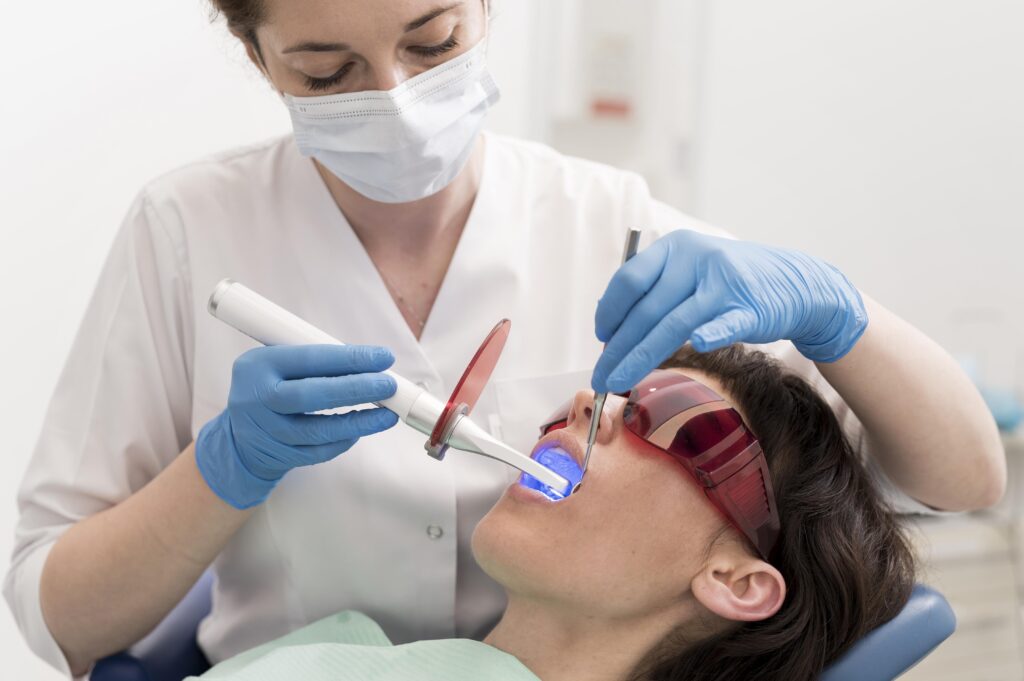Habit Management
At Dentistry Junior, we recognize child dental habit management equate to healthy oral habits in adulthood. Child Dental Habit Management are shaped by their daily practice routines. Oral care habits are developed in childhood, but habits that are thumb-sucking and prolonged pacifier use can be detrimental to their oral health. To avoid the big issues with their teeth and jaw alignment, habit management is so essential in children. With the appropriate and timely care, parents will help children develop positive habits that will lead to great oral health in the future.
The Importance of Habits in Young Patients
The oral care habits that children develop will be almost impossible to break as they grow. This includes positive habits such as brushing, flossing and regular dental visits, as well as negative habits like thumb sucking and prolonged feeding with a bottle. The negative habits that children learn can be very damaging and are much more difficult to break.

Dental alignment : Causing misaligned teeth and jaw growth problems
- Bite issues : Open bite, crossbite or deep overbite
- Speech development : Improper tongue posture may influence speech clarity
- Oral hygiene : Increased risk of cavities, gum problems, and enamel wear
Early intervention is crucial to correct or guide these habits in a gentle, child-friendly manner.
Common Negative Habits in Children and Their Effects
1. Thumb-Sucking and Pacifier Use
While these are natural comforting behaviours for infants, if prolonged beyond the age of 4–5 years, they may cause:
- Protruding front teeth (overjet)
- Open bite deformities where upper and lower teeth don’t meet properly
- Changes in jaw growth patterns
2. Tongue Thrusting
An incorrect swallowing pattern where the tongue pushes against teeth can result in:
- Open bite or spacing issues
- Difficulty with speech sounds
- Prolonged orthodontic concerns
3. Nail-Biting and Lip-Biting
These habits may seem harmless but can:
- Chip or fracture teeth
- Irritate gums and soft tissues
- Introduce infections from bacteria under nails
4. Prolonged Bottle-Feeding or Sugary Drink Intake
Extended bottle use, especially at night, may lead to:
- Baby bottle tooth decay
- Cavities in upper front teeth
- Poor dietary habits affecting overall oral health
How Dentistry Junior Helps with Habit Management
As the best pediatric dental clinic in Bangalore, we specialise in creating a supportive and friendly environment where children feel comfortable while learning to manage habits. Our approach is centred on positive reinforcement, age-appropriate counselling, and customised solutions for every child.
Positive Reinforcement Programs
- Reward systems such as sticker charts or small incentives to motivate children
- Fun storytelling to help children understand why breaking a habit is important
- Encouragement and gentle coaching rather than punishment
Habit-Breaking Appliances
When behavioural methods are not enough, we may recommend simple dental appliances that act as gentle reminders. These can be:
- Fixed appliances – Attached to teeth to discourage thumb-sucking or tongue thrusting
- Removable appliances – Worn for specific times of the day, training oral muscles to adopt healthy patterns
Tailored Counselling for Parents
We understand that every child’s needs are unique. Our team spends time educating parents on:
- How to identify harmful oral habits
- Strategies to guide children gently towards healthier routines
- Diet and lifestyle changes that support dental health
The Benefits of Early Habit Intervention
Benefits of correcting harmful oral habits at the right time include:
- Preventing the demand for extensive orthodontic treatment in the future
- Proper jaw growth and symmetrical face development Improved clarity of speech and efficiency of chewing
- Confidence in children due to healthier smiling Enhanced self-esteem for children Stronger lifelong oral hygiene habits.
- Early management of harmful habits spares children dental suffering, complex procedures, and unnecessary future expenses.
Why Choose Dentistry Junior?
Dentistry Junior stands distinguished as a premier pediatric dental centre in Bangalore dedicated solely to children’s dentistry. We fulfill our mission by providing customized complete compassionate and expert care to all children.
Our Different Mission:
- Bangalore’s pediatric dentists qualified in practice behavior management and child psychology.
- Child focus structures and surroundings built to minimize dental anxiety.
- Use of safe, advanced technologies and gentle techniques
- Specialised care for children with special healthcare needs
FAQs
Dentists can offer guidance on oral hygiene, identify habits impacting dental health, and provide strategies to manage habits like thumb-sucking or pacifier use.
Dental visits every six months allow the dentist to monitor habits, provide guidance, and intervene if needed to manage dental-related habits effectively.
Dentists can offer advice, encouragement, and suitable methods to gradually discourage these habits, often through positive reinforcement.
Start early, make it a fun activity, use child-friendly toothpaste, and supervise brushing until they’re capable of doing it effectively.
Dentists may suggest appliances or interventions, such as habit-breaking appliances or mouthguards, to address habits affecting dental health.

